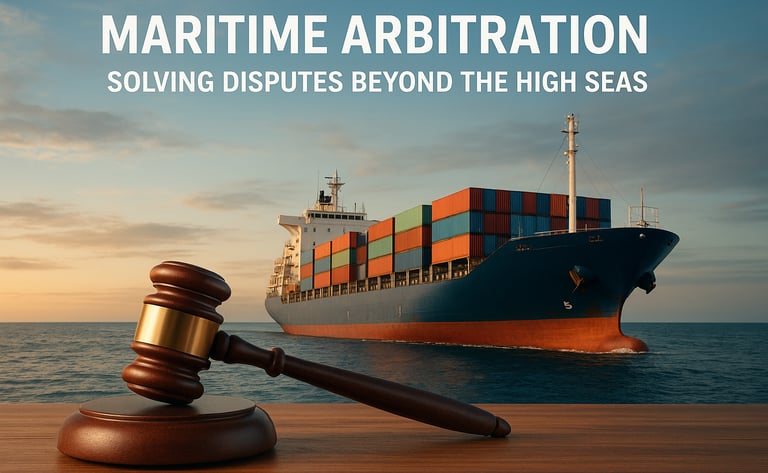Maritime Arbitration: Solving Disputes Beyond the High Seas"
Krishna Sree Baggam
9/2/20252 min read


Maritime Arbitration: Solving Disputes Beyond the High Seas"
Where there are ships, there are contracts—and where there are contracts, disputes are bound to follow. In the maritime world, disagreements can arise over damaged cargo, delayed voyages, unpaid charter fees, or even accidents at sea. But instead of going through long and expensive court battles, the industry often turns to a trusted solution: maritime arbitration.
As one London Maritime Arbitrators Association (LMAA) member once put it: “Shipping moves fast—our job is to make sure disputes don’t sink the deal.”
What Exactly is Maritime Arbitration?
Maritime arbitration is a specialized form of dispute resolution where parties (like shipowners, charterers, or cargo owners) agree to resolve conflicts through independent arbitrators instead of traditional courts.
Here’s how it works:
· Two parties sign a contract (e.g., a charterparty or bill of lading).
· If a dispute arises, the case is referred to an arbitration panel.
· Arbitrators—usually seasoned maritime lawyers or industry experts—hear both sides and give a binding decision.
Unlike courts, arbitration is faster, more private, and handled by people who truly understand shipping’s complexities.
Why Arbitration Matters in Shipping
Maritime trade accounts for over 80% of global commerce, and with such high stakes, disputes can be costly. Arbitration provides key advantages:
· Speed: Shipping contracts often require quick decisions to keep trade moving.
· Expertise: Arbitrators have deep knowledge of maritime law, insurance, and operations.
· Confidentiality: Unlike court trials, arbitration rulings are private, protecting business relationships.
· Global Recognition: Thanks to the New York Convention (1958), arbitration awards are enforceable in 170+ countries.
It’s no surprise that London, Singapore, and Hong Kong have become the world’s leading maritime arbitration hubs.
From Cargo to Collisions: Disputes on the High Seas
Maritime arbitration covers a wide spectrum of cases, reflecting just how complex global shipping really is. Charterparty disputes are among the most common, often sparked by disagreements over freight rates, demurrage charges, or vessel performance. Then there are cargo claims, which arise when goods arrive damaged, spoiled, or delayed—issues that can quickly turn costly.
On a larger scale, shipbuilding contracts frequently lead to disputes between shipyards and buyers, especially when deadlines slip or specifications aren’t met. And, of course, the sea itself creates conflicts: collisions and salvage disputes bring difficult questions of liability and cost-sharing to the arbitration table.
Each of these cases shows why the industry leans on arbitration—because only specialized, experienced experts can navigate the tricky waters of maritime law and deliver fair resolutions.
Arbitration’s Hidden Icebergs
Arbitration may be smoother than court battles, but it isn’t always plain sailing. Costs can feel heavy, especially for smaller disputes where legal fees sometimes rival the claim itself. Delays also creep in when arbitrators or key witnesses aren’t available, stretching out the process longer than expected. Add in the challenge of different legal traditions—with parties often coming from opposite ends of the globe—and uncertainty can rise.
Still, when weighed against the long, public, and often unpredictable nature of court trials, arbitration remains the industry’s trusted compass—helping disputes find resolution without sinking valuable business relationships.
Justice That Keeps Trade Afloat
Maritime arbitration may not be glamorous, but it’s one of the quiet engines that keeps global trade afloat. By offering fair, expert, and internationally recognized decisions, it ensures that disputes don’t paralyze the flow of goods across oceans.
In the words of one industry expert: “Arbitration doesn’t stop the storm, but it makes sure the ship doesn’t sink because of it.”
As shipping continues to grow more complex—with AI-driven vessels, green corridors, and digital contracts—maritime arbitration will remain the trusted anchor of fairness in an unpredictable sea.
